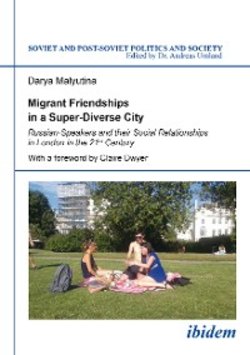Читать книгу Migrant Friendships in a Super-Diverse City - Darya Malyutina - Страница 5
Foreword
ОглавлениеFriendships, so integral to everyday social life, have been largely neglected in social science. Perhaps they are so commonplace and so ordinary they have remained invisible in our search for understanding of how social lives are experienced. However, more recently geographers and others have begun to recognise the importance of paying analytical attention to friendship patterns and networks. While most attention has been placed on children’s and youth geographies, there has also been a recognition of the significance of friendship in migration studies. As Tim Bunnell et al. (2012: 502) have recently argued, a focus on friendship is important in ‘unsettling the prevailing emphasis on kin and neighbourhood in seeking to understand the geographies of transnational social life’, for, as this study illustrates so well, friendship networks are often the key elements through which contemporary experiences of migration, settlement, and transnational lives can be understood. We have long recognised the role of networks in migration studies―the links which facilitate chains of migration to particular destinations, or the strong bonds which develop between people with shared national backgrounds or migratory experiences in new places. However, we have tended to theorise these networks through the anthropological lens of kin or ethnicity or to prioritise versions of familial networks. This pioneering study brings a fresh analytical insight to the value of studying and analysing friendship networks.
Darya Malyutina’s study of Russian-speaking migrants in London puts their friendship networks centre stage. She argues that for this diverse group of young migrants in London tracing their friendships offers the most insight to understanding migration trajectories and contemporary transnational lives. This innovative focus on friendship is based upon an in-depth and insightful qualitative methodological approach which starts not, as previous studies might have done, in an ethnic club or religious organisation, but in a bar. This ethnographic starting point enables Malyutina to then build up a sample of Russian-speaking migrants with whom she builds up trust enabling them to share with her their friendship groups. Malyutina’s focus on friendship groups allows her to tease out some of the important conceptual themes which frame her analysis and provide an important critique of the existing limitations of transnational studies of migration.
By tracing the informal friendships which are central to the lives of her informants, Malyutina destablises some of the confirmed assumptions about the place of ethnicity in migration studies through a nuanced analysis of when and how shared language or national identities matter to her respondents, but also the significance of diverse friendship networks possible within the global city. Indeed, as she illustrates, cosmopolitanism emerges as an important value for her respondents which challenges a reliance on inter-ethnic friendship networks and suggests that wider friendships produce changing dispositions towards ethnic diversity. A focus on friendship networks also provides a much-needed empirical depth to wider work on transnationalism. By analysing the range of friendships which migrants retain, Malyutina is able both to map empirically, and emotionally, how transnational ties are retained and valued alongside an analysis which links the scales of the local and the transnational. Indeed, as she argues, friendship has the ‘potential of inspiring and informing mobility’. Her work is important in challenging an assumption of a priori transnational or ethnic links, instead using her innovative focus on friendships to establish the importance or insignificance of these links empirically. Her findings are important particularly for migration studies, but they also provide important insights into the ways in which contemporary urban sociality is lived and experienced. This suggests that ‘the local’ and ‘the global’ are interlinked in dynamic and sometimes unexpected ways.
This book concentrates on the experiences of a group of migrants to London who have remained largely invisible in migration scholarship and too often caricatured in the popular imagination as either property millionaires or benefit dependents. As Malyutina carefully delineates, Russian-speaking migrants are a significant demographic but cannot be easily defined as a distinct ‘ethnic community’ and are often simply elided within a pejorative characterisation of ‘East Europeans’. This study is therefore particularly important in illuminating the experience of a distinct group of relatively recent, and poorly understood, migrants to London. It also offers significant new directions for future migration research on new migration to ‘super-diverse’ cities like London which is attentive to diversity and does not rely on narrow framings of either ethnicity or transnationality.
Darya Malyutina has opened up a new strand of migration studies in this book not only in the detailed insights she gives into her own case study of Russian-speaking migrants but also by offering a distinctive approach, through the analysis of friendship networks, for many other scholars of transnationalism and migration.
Claire Dwyer
University College London
July 2015
